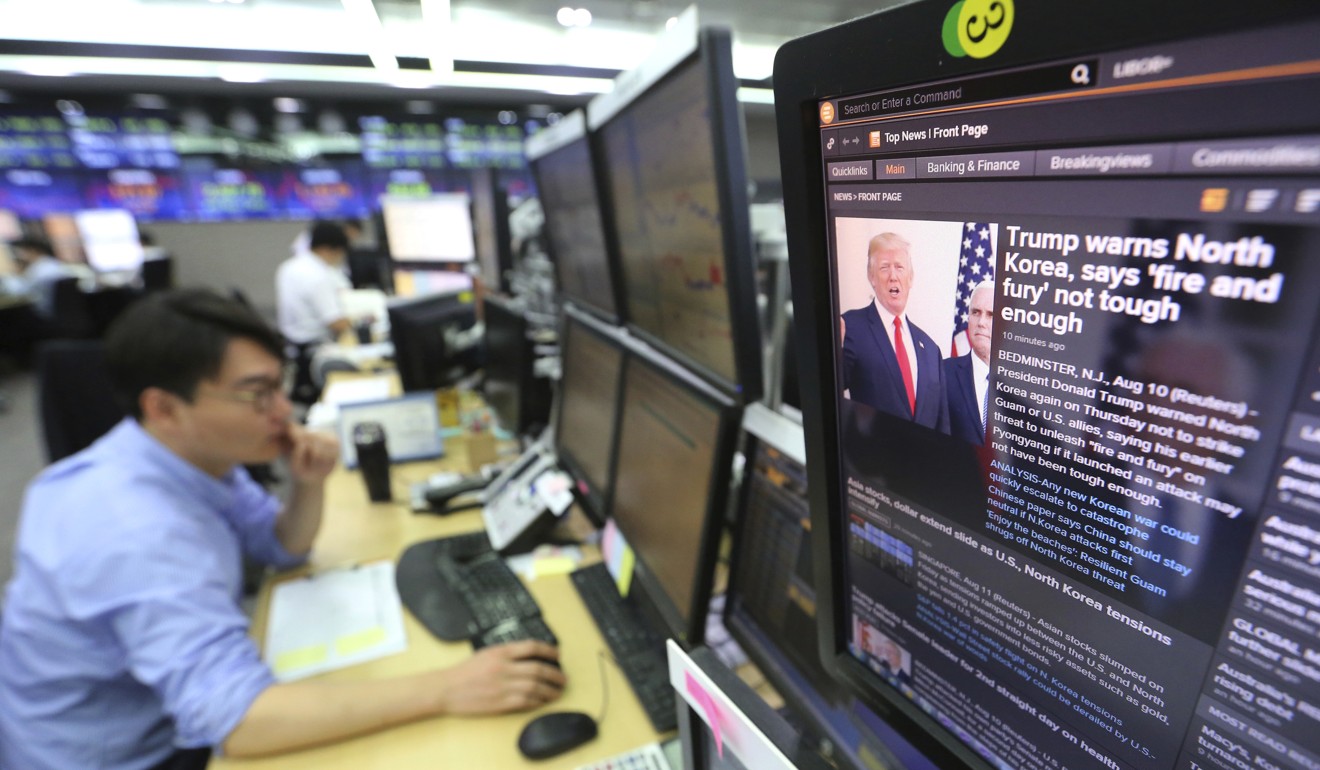
Wall Street halts global sell-off but US-North Korea tensions drive buying of gold and yen
Wall Street put a floor under global equities on Friday after a weak inflation reading brought investors back into US stocks even as tensions between the United States and North Korea continued to escalate and inspire safe-haven buying of gold and the yen.
A small rise in a measure of US consumer prices pointed to benign inflation that could make the Federal Reserve cautious about raising interest rates again this year, which would be favourable to equity investors.
The hope that the Fed will have to slow its rate increases appeared to stop, at least for now, the near US$1 trillion loss in world stocks valuations this week triggered by the war of words between Pyongyang and Washington.
“The slight bias to the upside (in stocks) is a result of the CPI number. The market is interpreting it as lowering the odds of the Fed raising rates in December,” said Keith Lerner, chief market strategist at SunTrust Advisory Services in Atlanta.
Reuters data show a 22 per cent perceived chance for a rate increase after the Fed’s December meeting.
Japanese markets were closed for a holiday, but the tense mood dragged Asian shares lower and an MSCI index of stocks across the globe posted its largest weekly drop since the week before Donald Trump won the US presidential election in November.
North Korea had responded to Trump’s previous promise to unleash “fire and fury” with a threat to land missiles near the US Pacific territory of Guam.
Trump issued a new warning to Pyongyang on Friday, saying in a tweet:
The Dow and S&P 500 inched higher on the day but they both posted their largest weekly percentage drops since late March.
“There’s not a great incentive to buy big,” said Lerner of SunTrust Advisory. “You’re less than 2 per cent off the high for the S&P heading into a weekend where uncertainty with North Korea still lingers.”
The Dow Jones Industrial Average rose 14.31 points, or 0.07 per cent, to end at 21,858.32, the S&P 500 gained 3.11 points, or 0.13 per cent, to 2,441.32 and the Nasdaq Composite added 39.68 points, or 0.64 per cent, to 6,256.56.
The pan-European FTSEurofirst 300 index lost 1.01 per cent and MSCI’s gauge of stocks across the globe shed 0.26 per cent for a weekly loss of 1.6 per cent, the largest since the week to November 4.
Emerging market stocks lost 1.27 per cent. MSCI’s broadest index of Asia-Pacific shares outside Japan closed 1.47 per cent lower.
South Korea’s KOSPI fell 1.7 per cent on Friday to its lowest since May 24, but its losses for the week were a relatively modest 3.2 per cent.

“Pretty remarkable, perhaps even extraordinary, considering,” said Tim Ash, strategist at fund manager BlueBay.
A Reuters Datastream index of more than 7,000 stocks across the globe saw its market capitalisation drop from a record high US$61.36 trillion on Monday to US$60.43 trillion at the close on Thursday.
Many world stock markets have hit record or multiyear highs in recent weeks, leaving them vulnerable to a sell-off, and the tensions over North Korea proved to be the trigger.
The yen on Friday added to a strong weekly rally against the dollar of close to 1.5 per cent, hitting its highest versus the greenback in almost four months, at 108.73 yen.
The yen tends to benefit during times of geopolitical or financial stress as Japan is the world’s biggest creditor nation and there is an assumption that Japanese investors will repatriate funds should a crisis take place.
The Korean won continued to fall versus the dollar, down 0.13 per cent to 1,143.5 on Friday for a 1.6 per cent decline on the week.
The dollar was further weighed down on Friday by the soft US inflation data.
“If the data continues to come in on the softer side, the market might start to price the Fed staying on hold this year,” said Sireen Harajli, FX strategist at Mizuho in New York.
The dollar index fell 0.32 per cent, with the euro up 0.42 per cent to US$1.1819.
Sterling was last trading at US$1.3007, up 0.25 per cent on the day.
The Japanese yen last strengthened 0.03 per cent versus the greenback at 109.22 per dollar.
In bond markets, the yield on US Treasuries fell, also pressured by the lowered expectations for a Fed move. “There are four more (inflation) prints between now and the December FOMC meeting and we expect the Fed to remain data-dependent, if a touch more cautious,” TD Securities said in a note.

Benchmark US 10-year notes last rose 6/32 in price to yield 2.1905 per cent, from 2.211 per cent late on Thursday. The 30-year bond was last up 4/32 in price to yield 2.7871 per cent, from 2.794 per cent late on Thursday.
After touching a more than two-month high at US$1,291.86, spot gold last added 0.2 per cent to US$1,288.81 an ounce. Its weekly gain of 2.6 per cent is the largest since June 2016.
Ongoing global glut concerns lingered in oil markets despite a bigger-than-expected draw in US crude inventories, leaving prices volatile.
US crude rose 0.41 per cent to US$48.79 per barrel and Brent was last at US$52.01, up 0.21 per cent.

